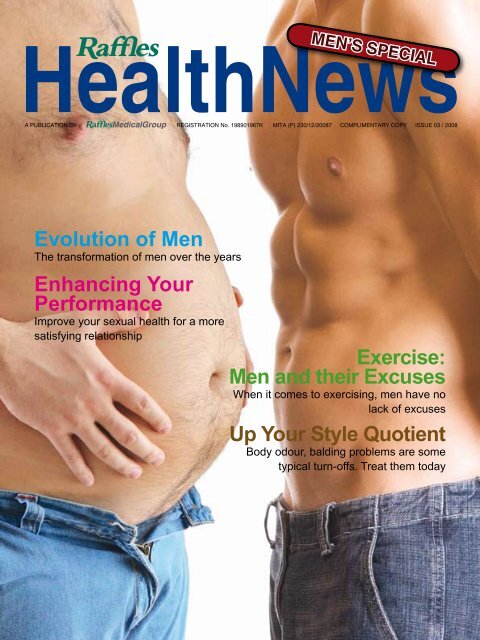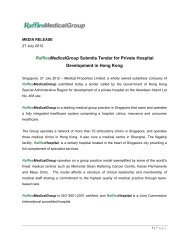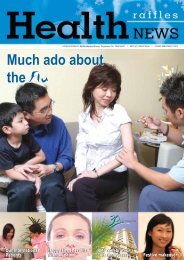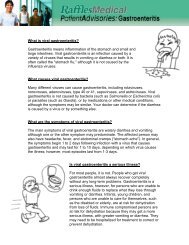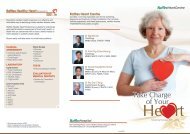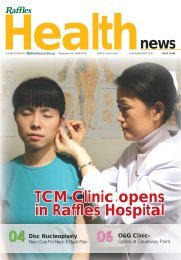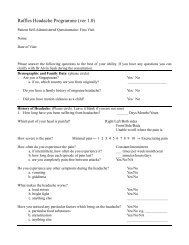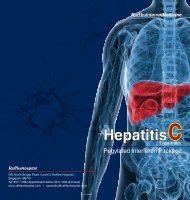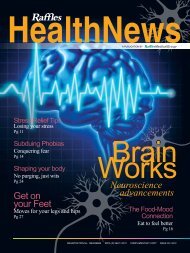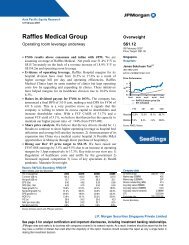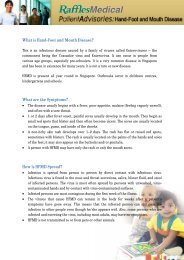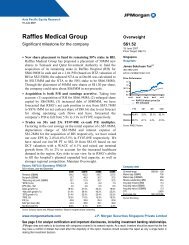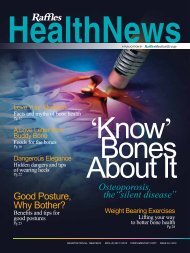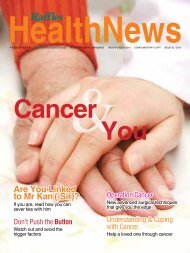Raffles Health News - Raffles Medical Group
Raffles Health News - Raffles Medical Group
Raffles Health News - Raffles Medical Group
- No tags were found...
You also want an ePaper? Increase the reach of your titles
YUMPU automatically turns print PDFs into web optimized ePapers that Google loves.
MEN’S SPECIALA PUBLICATION BY REGISTRATION No. 198901967K MITA (P) 230/12/20087 COMPLIMENTARY COPY ISSUE 03 / 2008Evolution of MenThe transformation of men over the yearsEnhancing YourPerformanceImprove your sexual health for a moresatisfying relationshipExercise:Men and their ExcusesWhen it comes to exercising, men have nolack of excusesUp Your Style QuotientBody odour, balding problems are sometypical turn-offs. Treat them today
Contents20145Evolution of Man 5As we grow older, we undergo physical and psychologicalchanges. Learn about these changes and take better controlof your life.<strong>News</strong>Room 3Airport medical services at T3 | First IVF baby |Services at <strong>Raffles</strong> Executive <strong>Medical</strong> Centre... and moreSupplements for Men 20FoodNotes / Q&A 26Promotions 27Features25UpClose 16Dr Lim Lian Arn, a Consultant Orthopedic Surgeon in<strong>Raffles</strong> Hospital, knows all the skeletons in your closet.Read what he has to say.Men & Cancer 10A closer look at the risks prostate and colorectal cancerspose to men.Matters of the Heart 12Heart disease is the world’s leading cause of death, causingone in three deaths.Enhancing Your Performance 14Sex is an important component to a fulfilling relationship.Learn how you can improve your sexual health for a moresatisfying relationship.Run Fat Boy Run 18Equipping our weekend warriors with the knowledge to takethem from the office to the track safely.Up Your Style Quotient 21Man are paying more attention to their appearances these days.By treating potential turn-offs, you can look better and increaseyour confidence.Exercise: Men and Their Excuses 24We all know the benefits of exercising. Yet, we are also familiar withthe excuses that we give whenever we were told to start moving.Overcome these excuses with friendly tips from our physiotherapist.DIRECTORYwww.rafflesmedical.comCorporate Accounts Enquiries 6311 1333Fax No. 6311 2383General Enquiries 6311 1111Fax No. 6311 2392• Anchorpoint 6479 3818• Ang Mo Kio 6453 2288• Anson 6225 2188• Bedok 6441 1736• Bishan 6456 7122• Capital Tower 6323 5212• Causeway Point 6894 0777• Clementi 6872 9043• Compass Point 6881 7337• Harbour Front 6273 3078• Hougang Central 6386 7896• Jurong East 6899 6688• Lot 1 6765 3363• Loyang Point 6585 3333• Marina Square 6339 6644• Millenia Walk 6337 6000• Ngee Ann City 6734 7355• Ogilvy Centre 6223 1188• OUB Centre* 6535 2222• <strong>Raffles</strong> Airport <strong>Medical</strong> CentrePasssenger Terminal Two* 6543 1118Passsenger Terminal Three* 6241 8818Airport Transit One 6543 1113Airport Transit Two 6543 1118Changi Cargo Complex 6543 1038• <strong>Raffles</strong> City 6339 6911• <strong>Raffles</strong> Hospital 6311 2233• Siglap 6442 0488• Science Park 6776 7155• Tampines Central 6787 8023• Tampines Junction* 6788 2222• TechPlace 6556 2318• Toa Payoh 6254 7667• Yishun 6755 0049* Clinics with X-ray FacilitiesHong Kong Clinics (852) 2525 1730www.raffleshospital.comGeneral Enquiries 6311 1111Call Centre Fax No. 6311 213624 Hour Emergency 6311 1555Admissions / Business Office 6311 1888<strong>Raffles</strong> International Patients Centre 6311 1666International Patients Centre Fax No. 6311 233324 Hour Appointments Hotline 6311 1222Fax No. 6311 2136Emailspecialist@raffleshospital.com<strong>Raffles</strong> Aesthetics<strong>Raffles</strong> Cancer Centre<strong>Raffles</strong> Children’s Centre<strong>Raffles</strong> Chinese Medicine<strong>Raffles</strong> Counselling Centre<strong>Raffles</strong> Dental<strong>Raffles</strong> ENT Centre<strong>Raffles</strong> Executive <strong>Medical</strong> Centre<strong>Raffles</strong> Eye Centre<strong>Raffles</strong> Fertility Centre<strong>Raffles</strong> <strong>Health</strong>Screeners<strong>Raffles</strong> Heart Centre<strong>Raffles</strong> Internal Medicine Centre<strong>Raffles</strong> Japanese Clinic<strong>Raffles</strong> Orthopaedic Centre<strong>Raffles</strong> Skin Centre<strong>Raffles</strong> Surgery Centre<strong>Raffles</strong> Women’s CentrePhysiotherapy CentreRadiologyRegional Representative Offices /Liaison CentresIndonesiaJakarta Representative Office 62 21 5785 3979Semarang Representative Office 62 24 841 9600 /845 7015Yogyakarta Representative Office 62 274 556 111 /556 222Makassar Representative Office 62 411 329 329VietnamHanoi Representative Office 84 4 5640 415Ho Chi Minh Representative Office 84 93 233 5868BangladeshDhaka Representative Office 880 1711187638Editorial: Dr Prem Kumar Nair, Lim Beng Gii,Magdalene Lee & Clara CaiCreative: Edd Chua & Jenny CheokThe information contained in this publication shouldnot be regarded as a substitute for detailed medicaladvice in individual cases.All rights reserved. No part of this publication may bereproduced in any form or by any means without thewritten permission of the publisher.Please address all correspondence toThe Editor, <strong>Raffles</strong> <strong>Health</strong><strong>News</strong>,Fax no. 6311 2378Email: media@rafflesmedical.com<strong>Raffles</strong> <strong>Health</strong><strong>News</strong> is published by<strong>Raffles</strong> <strong>Medical</strong> <strong>Group</strong> Ltd585 North Bridge Road, <strong>Raffles</strong> Hospital#11-00, Singapore 188770Aug 08
<strong>Raffles</strong> <strong>Health</strong><strong>News</strong> <strong>News</strong>room First IVF Babyfrom <strong>Raffles</strong><strong>Raffles</strong> Hospital welcomed its first baby born through in vitro fertilisationon 8 May 2008. The healthy bouncy baby boy weighed 2.72kg and is thefirst-born of proud parents, Mr Ng Cheng Soon and Mrs Jesslyn Ng.The Ngs decided to turn to Consultant Obstetrician & Gynaecologist, DrThong Pao Wen, from the Fertility Centre at <strong>Raffles</strong> Women’s Centrefor help, as they wanted to start a family after three years of trying.During that period, Mrs Ng had to come to the centre once a month forIVF treatments and check-ups. However, the effort paid off when theyfound out that they were expecting. “I was overjoyed and very happyto learn that I was expecting as I have been trying for some time”,said Mrs Ng.The Ng family with their latest addition - Baby Jayden, and Dr SheilaLoh, Clinical Director, Fertility Centre (left) and Dr Thong Pao Wen,Consultant Obstetrician & Gynaecologist (right).The pregnancy was also a miracle as only a single embryo wastransferred. Recalled Dr Thong, on the single embryo transfer and thesubsequent successful pregnancy of Mrs Ng, “I was overwhelmed as itjust made me feel that everything we did was ‘worth it’ ”.The Ngs have named their bundle of joy, Jayden Ng, and are alreadyplanning to have a second baby although they have not agreed howmany children they want eventually.SERVICEWITH ADIFFERENCEThe <strong>Raffles</strong> Executive <strong>Medical</strong> Centre (REMC) located in <strong>Raffles</strong>Hospital is the newest family medicine centre for the busy individualor family looking for health care and service with a difference. Youcan expect extra touches such as Internet access as well as lightrefreshments for patients.Care is delivered by a dedicated team of senior <strong>Raffles</strong> physicians,nurses and healthcare managers familiar with all aspects of primaryhealthcare. Your personal family physician will attend to all yourhealthcare needs. And should you require specialised care, you will besupported by specialists and other professionals from <strong>Raffles</strong> Hospital.Care is coordinated in a prompt and efficient manner at REMC.With REMC’s appointment system, you no longer need to spendlong hours waiting for your consultation. Appointments are promptand adequately spaced to allow more time for a more detailed andthorough consultation.Call 6311 2288 for an appointment now.PUMPIT UPDiabetes is a common chronic condition affecting one in 12 personsin Singapore. It is associated with serious complications such as heartattack, stroke, kidney failure, blindness and amputation. Althoughmaintaining optimal sugar levels can prevent these complications, inpractice, less than 50% of diabetics manage to achieve it.One of the most effective therapies for diabetes is insulin, which hasto be injected multiple times a day to mimic the natural physiologicalinsulin levels. Naturally, adherence to this by the patient is often poor.The insulin pump allows insulin to be delivered without the need for dailymultiple injections.The pump is programmed to deliver insulin constantly, at varyingrates. With a pump, one only has to insert the needle into the skin two orthree times a week, instead of up to four times a day with conventionalinsulin injection.Increasingly affordable, insulin pump therapy should be included as partof a comprehensive service for Type 1 Diabetes. People with Type 2Diabetes who are on insulin can also benefit from this.Too sick to make it to the doctor?Let the doctor come to you.House CallServices<strong>Raffles</strong> <strong>Medical</strong>’s house call service is a doctor-based practice withall calls answered by doctors. We will come to you in a fully-equippedambulance with doctors trained in emergency medicine, supported byparamedics and nurses, to attend to you.<strong>Raffles</strong> <strong>Medical</strong>’s house call services run 24 hours a day, 365 days a year.6311 1555
<strong>Raffles</strong> <strong>Health</strong><strong>News</strong> Feature Evolution of Men:Psychological and Physical ChangesAs men age, there will besubtle changes taking place inthemselves, both physically andpsychologically. In their twenties, menhave a fearless outlook to life; they arefull of zest and energy whether it is outpartying all night or working 18-hourshifts at work. In their thirties, whenhaving to balance family life, financialand work commitments, men struggleto contain the stress that comes withthese priorities. As they approach middleage, they start to battle changes both inthe physical aspect (dip in energy level,body growing out of shape and balding)and at the psychological front (dwindlinginterest in sex, financial and familycommitments, and immense challengesat the workplace) while trying to keepup with colleagues who are decadesyounger and could work longer hours.The vast majority of people seeking helpfor emotional issues are women. Whatthen, about men? Does it mean thatmen are the stronger race? Or does itmean that men sometimes have moreproblems seeking help?Research studies have shown that bythe year 2020, the life expectancy ofboth men and women in Singapore willbe over 90.Men can take a leaf from the Cree(American Indian) tradition in which theyhave seven stages of life. It is noted thatnot all people go through all the stages, andthat some get stuck along the way. Also,not everyone goes through the stages atthe same age, and it may be possible to gothrough them more than once.Here are the stages. You can decidewhat stage you are in and whether it istime to move on or not!1. Happy TimesUsually childhood till puberty - feelinggenerally happy about life as long aswe are safe and have our basic needsmet. (In our rather demanding schoolsystem though, sometimes this maynot always be the happy time it wasmeant to be.)2. ConfusionPuberty - where you do not really knowwhat to believe, do not know who weare, our bodies are changing, and ouremotions are running wild. Today’s worldmay be totally changed by the computerage where discovering who you arecan be done by spending inordinateamounts of time on the Internet.3. SearchingUsually the late teens or earlytwenties - looking for truth. We donot necessarily want to buy intoestablished ways of doing things, andwant to discover our own version ofthe truth. There is a need to strike outon our own.4. TruthUsually early to mid twenties wherewe decide who we are and what westand for.5. DecisionsMid twenties onwards - finding apartner, getting married, choosing aprofession or life path to follow.6. Planting Time“First adulthood”. This occurs in thetwenties to forties where we raise afamily and establish ourselves in ourwork or community.7. TeachingLate forties onwards - where we moveinto our second childhood, where weexplore the meaning of our lives andof life in general, reflecting on what wehave learnt, and begin to pass on ourknowledge to the next generation. Thetransition from the first adulthood to thesecond can sometimes be really difficult,but this is the beginning of elderhood.There are some similarities to what we gothrough here in Singapore. The early stagesof adulthood are seen as times to chaseour dreams. Here, people usually developan idea of what they want to do, and workto achieve it. While it may be important topursue a career goal single-mindedly, alltoo often, many men rush blindly throughlife without taking the time to decide whatis really important in life. They soon findvaluable time or relationships gone, orhealth impaired, or even difficult patternsof behaviour ingrained such that changeis difficult. It is therefore, important to taketime out (outside the realm of work) to do astock take and spend some time, reflectingon our stage in life.By Dr Munidasa Winslow,Consultant Psychiatrist, <strong>Raffles</strong> Hospital
Feature <strong>Raffles</strong> <strong>Health</strong><strong>News</strong>“MEN”Evolution of Men:PAUSEAs men age, one of the biologicalchanges they experience isandropause.Andropause, also called male menopause,is sometimes used to describe a reductionof the production of certain hormonessuch as testosterone. It is a normalpart of ageing, and for some men, it isaccompanied by a gradual and undesireddecline in their sexuality, mood and overallenergy. Sometimes, it can even exposemen to more serious health risks.Similar to the female menopause,men are affected by the onset ofandropause between the ages of 40to 55. Unlike women, however, thesymptoms of andropause are not aswidely researched, and as such, mendo not have a clear signal when they areentering the andropause stage. The mainindicator is a drop in the testosteronelevel, as well as accompanying physicaland psychological changes. A decline intestosterone level can also increase thehealth risk for the men in the areas ofheart and bones.Most men, however, will experiencesome kind of mid-life crisis when theystart to grapple with questions relating totheir careers, values, accomplishments,direction in life and self-worth as theybegan the process of internal reflection.Going downhillA man’s transition to an andropause stageis more gradual and takes place over aperiod of time, unlike women. Attitude,psychological stress, alcohol, injuries orsurgery, medications, obesity and infectionscan contribute to its onset.It is common fact that as a man ages, histestosterone level will decline. However,there is no dipstick measure to find outwhich man will experience andropausalsymptoms of a certain severity, whichnecessitates seeking medical help. Itis also difficult to predict at what agethe symptoms will occur in a particularindividual. Each man’s symptoms mayalso be different and vary with the others.CausesAfter age 30, men will experience a declinein their testosterone levels which drop byabout 10% every decade. At the sametime, another hormone known as theSex Binding Hormone Globulin, (SHBG),is increasing. SHBG traps much of thetestosterone that is still circulating andmakes it unavailable to exert its effectsin the body’s tissues. What remains isknown as “bioavailable” testosterone.Andropause is associated with lowbioavailable testosterone levels. Everyman experiences a decline of bioavailabletestosterone but some men’s levels diplower than others. When there is a loweringof bioavailable testosterone, men canexperience andropausal symptoms.These symptoms can impact their quality oflife and may expose them to other, longertermrisks of low-testosterone. Testosteroneis important as it helps to build protein andis essential for normal sexual behavior andfor producing erections. It also affects manymetabolic activities such as the productionof blood cells in the bone marrow, boneformation, lipid metabolism, carbohydratemetabolism, liver function and prostategland growth.Are You Andropausal?Men with low bioavailable testosteronelevels will find themselves experiencingsome of the following:· Low sex drive· Emotional, psychological and behavioralchanges· Decreased muscle mass· Loss of muscle strength· Increased upper and central body fat· Osteoporosis or weak bones and backpain· Cardiovascular riskTreatment for AndropauseAccording to Dr Eng Soo Kiang, FamilyPhysician, <strong>Raffles</strong> <strong>Health</strong>Screeners,some treatment options that are found tobe effective are:· Exercise, dietary changes, stressreduction· Couple counselling, career refocusing,spiritual support· Treatment for depression· Chemical dependency treatment, sexualcompulsivity treatment· Androgen Replacement TherapyAndrogen ReplacementTherapy (ART)The most important factor in theevaluation and treatment of andropauseis the public awareness of its frequentoccurrence that will stimulate the use ofappropriate screening tests, beginningwith a morning testosterone level.“ART has been shown to produceimprovements in many of these areas. ARTcan be highly beneficial in alleviating thesymptoms of andropause and improvingquality of life,” said Dr Eng.He added that this practice is notwithout risks, both proven and theoretic.Additionally, the diagnosis of androgendeficiency and the decision to treatis not always straightforward. It isnecessary to have careful screeningand meticulous follow-ups.It is essential for anyone that the followingcriteria are met before using ART:
<strong>Raffles</strong> <strong>Health</strong><strong>News</strong> Feature • The presence of symptoms and bloodtests supporting the diagnosis• Conditions that make ART undesirablemust be screened for• A doctor familiar with the diagnosis,treatment and monitoring of andropause• Patient is well-informed and is committedto diligent and competent follow-upsfor the duration of the treatmentPatients can also enquire if the doctoris sited in a multi-disciplinary centrewhere there are other specialties to lookafter the diverse and complex needs ofan andropausal man. For example, anurologist, endocrinologist, psychiatrist,cardiologist, ear, nose and throatspecialist, dietician, exercise therapist,clinical psychologist, sex therapist andother complementary health practitioners.Treatment Steps for ARTDr Eng advises that men should seek aspecialist doctor in andrology and men’shealth to draw up a comprehensivecare plan jointly that is both acceptableand beneficial to him.It involves:••••••••••<strong>Medical</strong> nutritionPrecise exercise prescriptionSleep optimisationSmoke cessationCancer screeningLiver and bone careSex therapy, marital and fertilityassistanceDiabetes, cholesterol andhypertension co-managementOrchestrating community /social support system for patientAttention to the multifaceted malegender roleIndividualised androgenreplacement therapy•
Feature <strong>Raffles</strong> <strong>Health</strong><strong>News</strong>BELLYBELLYEvolution of Men:FATAgeing and andropause notonly contribute to a decliningtestosterone level, it can also bringabout the dreaded belly fat in men.One obvious effect of andropause isan increase in body fat, in particular,abdominal fat. Most commonly knownas belly fat, many men find themselveswith this piece of extra luggage soonafter they join the workforce. When incollege they used to be physically active,exercise now take a backseat to theircareer, social lives and everything else.As a result, it is not uncommon for thislittle roll of fat to grow further.Pointing to alcohol as the main culpritand in a vain attempt to be seen as moremasculine, these men have taken tocalling their little pot of fats, a beer bellyor beer gut.A beer belly or beer gut is characterisedby a horizontal overhang of fat abovethe waist, while the rest of body has littleapparent fat. There is no scientific linkbetween the consumption of beer and abelly although it is a contributing factor.Belly fat is usually found in men asthey have a greater tendency to storeexcess fats on the waist and abdomenwhile women store excess fat in otherareas such as the hips and buttocks.A lack of muscle tone in the abdominalmuscles contributes to the appearanceof the beer belly, with the overhang oftenincreasing with age. The overhang offats also points to a condition known asabdominal obesity.From as early as age 25, men start tolose muscle and gain fat if they do notwatch their diet or undertake some formof regular exercise. Ageing also slowsdown a person’s metabolic rate andalthough you may have maintained yourweight since young, you would probablyhave a higher body fat content and lessmuscle now then you had back then.Abdominal obesity is caused by a lessvisible, but more insidious type of fat,known as visceral fat. Visceral fat settlesdeep inside the abdominal cavity, wrappingitself around several internal organs and isa risk factor for heart disease.Fat is actually considered an active organand not inert as many people thought. Fatproduces proteins called adipocytokinesthat promote inflammation and areassociated with an increased risk of heartdisease. Chronic inflammation can injurethe lining of artery walls, making themsusceptible to the accumulation of fattyplaque deposits that can ultimately ruptureand cause eventual heart attack or stroke.The Risks of ExcessBelly FatWhy is it important to lose belly fat?Carrying extra weight, especially fat, inyour abdominal area poses a high risk,as visceral fat is worse for your healththan the subcutaneous fat that sits underthe skin. Belly fat is often associatedwith inflammation and a higher risk ofhealth problems such as cardiovasculardisease, diabetes, metabolic syndromeand more.Flat Abs - Myth or Fact?The good news is that it is possible tolose the spare roll and achieve a flat andtrim, and even a washboard stomach.The bad news is that you would need toinvest time and effort to flatten the hill.There is no special diet pill or plan,no specific food and no single type ofexercise that specifically targets belly fat.However, abdominal fat is the first kind offat you tend to lose when you lose weight.Whether you are an “apple” shape withexcess belly fat, or a “pear” with widehips and thighs, when you lose weight,you will most likely lose proportionatelymore from the abdominal region thanelsewhere. This is because visceral fatis more metabolically active and easierto lose than subcutaneous fat.To lose the flab, you need to lose weightand keep it off, through a healthy dietwith regular exercise of 30 minutes to anhour, three to five times a week.Spot exercises like sit-ups or cruncheseach day would help flatten your belly,but you would still need to lose weight.They may only help to strengthen yourcore muscles, helping you look moretoned but your belly will still remain if youdo not reduce weight.You can have the most toned anddefined abdominal muscle but they willnot show through if there is a layer offat over them. Engage in a mix of highintensitycardiovascular and weighttraining exercises to help you loseoverall weight.HN
<strong>Raffles</strong> <strong>Health</strong><strong>News</strong> Feature Tips for A Flat AbLift weightsThe more muscle your body has, themore calories your body burns, evenat rest. To get rid of that fat quickly, doweight lifting activities combined withcardiovascular exercises.Keep metabolism steadyEat one small meal every three to fourhours to keep your metabolism burningcalories.Eat smaller dinnersTry not to have a heavy dinner as mostof us are not very active at night. Ifyou’re hungry, snack on fruits or otherhealthy, low calorie snacks.Eat more fibreFibre fills you up more quickly andmakes you feel less hungry. Aim forhigh fibre foods like whole grains, fruitsand vegetables, and nuts and seeds.Eat breakfastEating breakfast will prevent the hungerpangs from coming on in the later partof the day causing you to overeat forlunch. Easy to make breakfast includescereal, sandwiches or fruits.Be hydratedDrink up on water but not sugarycarbonated or flavoured drinks. Veryoften, dehyration is mistaken ashunger. If you consistently feel hungryafter meals, do not immediately thinkthat you need to eat more. You maysimply be thirsty!
10 Feature <strong>Raffles</strong> <strong>Health</strong><strong>News</strong>CancerDangersColorectal cancer and prostate cancerare increasingly common and oftenfatal diseases that strike men. Welook at these two cancers in detail tounderstand the risks they pose to men.Prostate CancerDownUnderSmall in size, big in problemThe prostate is a small gland the size ofa walnut located below the bladder andfound only in men. It surrounds part ofthe urethra that allows the passage ofurine from the bladder to the penis. Thecells that make up the outermost part ofthe prostate can become cancerous andgive rise to prostate cancer.Prostate cancer is now the third mostcommon cancer in men. What makesone more susceptible to prostatecancer? According to Dr Fong Yan Kit,Consultant Urologist, <strong>Raffles</strong> SurgeryCentre, at risk are men above the ageof 50, obese, and/or those with a familyhistory of prostate cancer.“Prostate cancer is largely due toaltered genes which can be inheritedor due to environmental factors suchas their diet.” said Dr Fong.SymptomsEarly prostate cancer is usually withoutany symptoms and may be picked upincidentally during a routine examinationof the anus and rectum. Advancedprostate cancer presents itself withdifficulty in passing urine. As the cancercan spread to any organ or tissue in thebody, there may be symptoms such asbone pain in the later stages.DiagnosisLocated in front of the rectum, theprostate can be physically examinedwith a gloved finger by a doctor. Bloodtests (prostate specific antigen or PSA)can also help diagnose prostate cancer.Prostate cancer may also be diagnosedin the tissue removed during surgeryfor an enlarged non-cancerous prostategland to relieve difficulty in passingurine.Clinical examinations, X-rays and pathologyreports will help the medical team decidewhat is the ideal course of treatment foreach case. With prompt and appropriatetreatments, the outlook for a person withprostate cancer is reasonable.Treatment AlternativesSurgery for prostate cancer would see theentire prostate gland and nearby tissuesremoved. Potential complications aftersurgery include impotence and difficulty incontrolling urine because delicate nervesmay be damaged during the procedure.Radiation therapy is the use of highenergyrays focused on the cancer.Hormonal therapy stops the productionof male hormones or block malehormones from reaching the cancer.Prostate cancer depends on malesex hormones to grow. Without them,prostate cancer growth is affected.Another form of hormonal therapy is theremoval of both testes, which removesthe main source of male sex hormones.Chemotherapy is the use of drugs thatkill cancer cells. Drugs are injected intothe veins or taken orally in tablet form.When hormonal therapy no longer worksin patients with advanced prostatecancer, chemotherapy may be used butis generally not very effective.Did You Know?About one in six men will bediagnosed with prostate cancerduring his lifetime, but only one in 34actually die of the disease. Most menwith prostate cancer die from old ageor other causes.
<strong>Raffles</strong> <strong>Health</strong><strong>News</strong> Feature 11Colorectal CancerFastest growing cancerColorectal cancer is one of themost common cancers worldwide.In Singapore, it is second only tolung cancer and the numbers arefast becoming the same.Currently, more than half of those affectedwill die from this disease. However, mostcases of colorectal cancer are curable ifdiagnosed in the early stage.About 90% of those with colorectal cancerare above 40 years of age. However, DrNg Chin, Consultant General Surgeon,<strong>Raffles</strong> Surgery Centre, is seeing aworrying trend - younger patients withmore aggressive cancers.Said Dr Ng, “Most colorectal cancercases are sporadic and occur secondaryto gene mutations. However, damagedDNA due to defects in the normal DNArepair process (microsatellite instability)has been proven to cause colorectalcancer. At risk are those with a personalhistory of ulcerative colitis, or colonpolyps or cancer, and cancers of otherorgans, especially the breast or uterus.”Colorectal cancer can also be hereditary.“If you have a first degree relative withcolorectal cancer, you have a six to 12-fold increased risk of developing cancer.As such, screening for colorectal canceris very important,” said Dr Ng.SymptomsColorectal cancer can present itselfin many ways. Common symptomsinclude:••••••••Bleeding from the rectrumRecent change in bowel habitIncomplete evacuation of stoolsNarrow calibre stoolsUnexplained weight lossPoor appetiteRaised Carcinoembryonic Antigen(CEA) tumour marker testPositive stool occult blood testTreatmentThe primary treatment for colorectalcancer is surgery. Chemotherapy andradiotherapy are sometimes used inaddition to surgery. Between 80%to 90% of colorectal cancer patientsrecover if the cancer is detected andtreated in its early stages. The cure rateshowever drop to less than 50% in thelater stages.PreventionNearly all colon cancers begin as polyps.These growths occur on the bowel walland may eventually grow in size andbecome cancerous. Removal of polypswill effectively treat the ‘cancer’ evenbefore it is cancerous.To reduce the risk of contractingcolorectal cancer, you can have benignpolyps removed through a colonoscopy.In addition, the colonoscope providesa thorough bowel examination.There is some evidence that a high-fibrelow fat diet may play a role in preventingcolorectal cancer.Finally, you should take note of changesin your bowel habits and see a doctorshould you fall under the “high-risk”category.HNDid You Know?Ensure a low-fat diet as colorectalcancer has been associated withdiets high in saturated fat.Colorectal cancer risk can bereduced with regular screenings.Talk to your doctor when youshould begin screening and whattests should be considered at thattime.
12 Feature <strong>Raffles</strong> <strong>Health</strong><strong>News</strong>Matters of the HeartHeart stopping killerAccording to the World Heart Federation, heart disease isthe world’s leading cause of death, causing one in threedeaths. And adding to the bad news, men are three tofive times more likely to contract heart disease as comparedto women.“Though the figures may be disheartening, heart diseasescan be prevented, managed and treated,” said Dr Ng Wai Lin,Consultant Cardiologist, <strong>Raffles</strong> Heart Centre. “Using medicines,changing diet, exercise and lifestyle habits, and opting for surgeriesand even heart transplants, can help sufferers of heart diseases.”Coronary Artery DiseaseCoronary artery disease is one of the leading causes of deathin Singapore. However, it can be prevented by managing itsrisk factors.Risk factors for coronary artery diseases can be largely dividedinto non-modifiable factors and modifiable factors.Non-modifiable risk factors:••••Increased ageMale, and female after menopauseEthnicity; South Asians and Malays are at higher risk thanChineseFamily history“While you can’t change your gender, your family and the factthat you age, there are modifiable factors that could vastlyimprove your chances of having a healthy heart,” said Dr Ng.Modifiable risk factors:••••••••High blood cholesterolHigh blood pressure / hypertensionDiabetes mellitus and abnormal blood sugar levelsMenopauseObesityPhysical inactivitySmokingStress
<strong>Raffles</strong> <strong>Health</strong><strong>News</strong> Feature 13RightUpperChamberRightLowerChamberHeart FailureHeart failure occurs when the heart losesthe ability to pump enough blood to thebody’s tissues, resulting in insufficientoxygen and nutrients for properfunctioning of the main body organs andother tissues. Our brain cells can die ifdeprived of oxygen for more than threeminutes. Our muscle cells live on forseveral hours while our bone and skincells can stay alive for several days.Blockages in the arteries (coronary arterydisease), disease of the heart valvesand irregular heartbeats (arrhythmia) arecommon causes of heart failure.CausesThe most common causes of heartfailure are:••••••Coronary heart disease andheart attack (which may be “silent”)Cardiomyopathy(disease of the heart muscles)High blood pressure (hypertension)Heart valve diseaseCongenital heart diseaseAlcoholism and drug abuseSymptomsLeftUpperChamberLeftLowerChamberA person with heart failure may experienceshortness of breath and coughing causedby the fluid build-up in the lungs orpulmonary oedema. It may cause theperson to cough up bubbly phlegmcontaining blood. Other symptoms ofheart failure include fluid build-up in theveins and body tissues causing swelling ofthe feet, legs and abdomen. When bodytissues, such as organs and muscles, donot receive enough oxygen and nutrients,they cannot function well, leading totiredness and dizziness.DetectionDiagnosis of heart failure is based on:•••••••The heart is a fist-sized organ that pumps blood in the body. Oxygen-poorblood enters the right upper chamber, flows through the right lower chamberand through the pulmonary artery to the lungs where the blood is enrichedwith oxygen. The oxygenated blood is then carried back to the left upperchamber of the heart into the left lower chamber and then pumped out tothe rest of the body. This important process is necessary for the cells in ourorgans and body to function.Symptoms<strong>Medical</strong> historyPhysical examinationChest radiographElectrocardiogram (ECG)Other imaging testsCardiac catheterisationTreatmentHow Your Heart WorksHeart failure is usually treated with lifestylechanges and medicine. Sometimes,surgery is required to correct abnormalitiesof the heart or heart valves.Congenital heart defects and abnormalheart valves can be repaired with surgery.Coronary artery diseases can be treatedwith angioplasty or a heart bypass surgery.For patients with severe heart failure, theheart muscle may become so damagedthat available treatments are unable tohelp. End-stage heart failure patientscan consider heart transplantation.Other than lifestyle modifications, medicaladvances are at hand to help. With thisarsenal of modern know-how, heartdiseases need no longer to be as fatal asthey used to be.HNTips for a healthy heartFood for thoughtAvoid high cholesterol food andsaturated fats. Choose lean meat,fish and low-fat dairy productsinstead and increase your intakeof fruit and vegetables.Active lifestyleExercise at least three timesa week to prevent heart andblood vessel diseases. Althoughthere are many kinds of physicalactivities, brisk walking is one ofthe best. Check with your doctorto see what is suitable for you.Stop smokingHeart disease is more commonin smokers. Smoking is a majorcontributor to heart disease risk.High-risk groups also get heartdiseases earlier. To reduce yourrisk of getting heart disease, stopsmoking.Weight watchMaintaining a healthy bodyweight reduces the risks of heartdisease. To give you a good ideaof whether you are keeping ahealthy weight, your Body MassIndex [BMI = weight (kg) / Height(m) x Height (m)] should not bemore than 23. The waist-to-hipratio is another useful guide. Aratio of more than 0.9 for menand 0.85 for women indicatesincreased health risks.RelaxManage stress by engaging inregular exercise. It is importantto have work-life balance. Asfar as possible, relax to easethe tension whenever feelingsof stress arise since stress mayaggravate heart disease.
14 Feature <strong>Raffles</strong> <strong>Health</strong><strong>News</strong>EnhancePerformanceYourSexual performance is an issue that men are always concerned aboutbut seldom dared to ask about. What exactly is normal? Where can Iget help? We explore these issues with doctors from <strong>Raffles</strong> Hospital.Did You Know?If it is good for yourheart, body andmind, it is also goodfor your sex life.had many male patients fromall walks of life coming to my clinic,”“I’vesaid Dr Fong Yan Kit, ConsultantUrologist, <strong>Raffles</strong> Surgery Centre, “theywere very intrigued by sexual performanceenhancing products even though some ofthem don’t really need them.”So what is considered normal sexualperformance? And what is with theseproducts that drive men in droves to thedoctor’s room when these same men willbrush away calls to see their doctor fortheir sniffly nose?Engine TroubleshootSex-life is an important component ina successful marriage, even in elderlycouples. To achieve a healthy sexlife, there are drugs which help menmaintain a healthy sexual relationshipwith their spouse.Is your sexual life satisfying you and yourpartner? We look at common problemsand how they can be treated.1 2Getting It UpErectile dysfunction (ED) is a conditionwhere you have trouble getting orkeeping an erection that is strong enoughfor vaginal penetration.Modern science has made it possible forED to be treated with the use of drugs. Thiswould require a visit to the doctor’s for anaccurate assessment of your condition.Said Dr Fong, “Viagra, Cialis and Levitraare the three most common drugsand the usual first line of medicationsprescribed for erectile dysfunction.They are all phosphodiesterase type5 inhibitors and work in the same way,differing only in the onset and durationof action.”Too Fast, Too FuriousOne of the major grouses that womenhave is that men tend to ejaculate toosoon. Experts say most men reachorgasm in under three minutes (after
<strong>Raffles</strong> <strong>Health</strong><strong>News</strong> Feature 1530 to 60 thrusts). Women, on the otherhand, require at least seven minutes.“Premature ejaculation is defined as theinability to control ejaculation to satisfya partner 50% of the time,” explainedDr Fong, “this is very subjective with noexact time guideline.”In general, relaxing and practising can helpyou deal with the problem. You can distractyourself by thinking non-sexual thoughts toavoid becoming excited too soon.“Treatment options usually begin withpsychosexual counselling which hasbeen proven to work for some couples,”said Dr Fong, “Those who need theextra help will then be prescribedtopical and oral medications.”3Are We There Yet?Retarded ejaculation is a medical conditionin which the man is unable to ejaculate,either during intercourse or with manualstimulation in the presence of a partner.Most men ejaculate within two to fourminutes after onset of active thrusting inintercourse. Men with retarded ejaculationmay be entirely unable to ejaculate in somecircumstances, or to ejaculate only withgreat effort and after prolonged intercourse(for example 30 to 45 minutes).According to Dr Eng Soo Kiang, FamilyPhysician, <strong>Raffles</strong> <strong>Health</strong>Screeners, “Themost common causes for retardedejaculation are psychological, such asfear, anger or stress. Making love understress or fear can result in problems withejaculation.”Other causes for retarded ejaculationinclude drugs and neurological disease.Depending on the cause, doctors wouldthen recommend therapy, hypnosis orchanging of medications.Marital stress, sexual dissatisfaction,inhibited sexual desire, and avoidance ofsexual contact may result if the problemis not addressed and remedied.<strong>Health</strong>y attitudes toward sexuality canhelp prevent retarded ejaculation.To prevent retarded ejaculation, Dr Engadvised that couples should enjoy themoment of pleasure rather than to beconcerned about ejaculation. Partnersshould also support by providing arelaxed atmosphere, free of pressure. Anopen discussion of any fears or anxietiesis also beneficial.Chinese MedicineWhen one talks about erectile dysfunction,Traditional Chinese Medicine (TCM) is notusually the first thing that comes to mind.As Mr Wu Yue, TCM Physician of <strong>Raffles</strong>Chinese Medicine shared, “Many of myfirst-time patients assume that TCMwould be a painful alternative to Westerntreatments. But it really is a safe andeffective option with few side effects.”According to TCM, erectile dysfunction iscaused by one of the following:• Intemperance of sexual life and declineof fire in ‘mingmen’ (gate of life)• Stress or anxiety that impairs the heartand spleen and leads to blockage• Downward migration of damp-heatin the liver and kidney that leads toflaccidity of the genitalia.Treatments that TCM physiciansemploy include acupuncture withmoxibustion and herbs and pills. Witha holistic approach towards erectiledysfunction, Mr Wu pointed out thatunderlying causes of the dysfunction, suchas diabetes, anxiety, or hypertension, canalso be treated at the same time.“In this way, the patients’ general health andwell being would also see improvement,”he said.Rev It UpPatients who receive help for their sexualhealth do not just have better sex. Theyfeel better and generally lead a betterquality of life.Speak to your doctorif you are not satisfiedwith your performance.Be it to regain your manlyconfidence or to alleviateyour concerns, an improvedsexual life can give you abetter quality of life. HNDid You Know?Over-indulgencein sexual life inevitablyconsumes renal essence,impairs primordial ‘qi’ andcould lead to erectiledysfunction.Lifestyle Changes toEnhance Your LibidoLose weightOverweight persons will find that losingeven a few kilos can stimulate sexhormones.Eat rightChoose nutritious food which controlcholesterol and blood sugar levels.Heart friendly foods such as grains,fruits, nuts, vegetables, and leansources of dairy and protein can helptoo.Exercise regularlyBuild up endurance and your heartby adding a few high-intensity boutsto your fitness routine. Also considerstrength training for shapely muscle,keep your body fit for your daily activities(including sex).Rest and relaxGet in the mood for love by havingample rest. Sex is usually thrown out ofthe window if you’re exhausted.Think positiveWhatever your body shape or size,accept yourself and see its potentialfor sensuality.<strong>Raffles</strong> <strong>Health</strong><strong>News</strong> • 15
16 UpClose <strong>Raffles</strong> <strong>Health</strong><strong>News</strong>UpClosewithDr Lim Lian ArnOrthopaedic Surgeon, <strong>Raffles</strong> HospitalDr Lim Lian Arn is a Consultant Orthopaedic Surgeon in<strong>Raffles</strong> Hospital who specialises in adult reconstructivesurgery, knee and hip replacements, traumatology andarthroscopic surgery for knees, shoulders, ankles and wrists. Asan active sports person, Dr Lim also has special interests in sportssurgery.Drawn to the <strong>Group</strong> Practice Model in <strong>Raffles</strong> Hospital wheredoctors work as a team to provide integrated and coordinatedcare, Dr Lim decided to join <strong>Raffles</strong> Hospital in December 2002.In this issue of UpClose, Dr Lim shares with us his thoughts aboutwork, health and life.
<strong>Raffles</strong> <strong>Health</strong><strong>News</strong> UpClose 17So doc, why did you study medicine?NUS didn’t offer aeronautical engineeringat that time and architecture didn’t wantme.But what’s up with bones?When I was in medical school, I broke myleft arm in a rugby game. The idea of puttinga metal plate and screws inside someoneso fascinated me that I became hooked.You work at the <strong>Raffles</strong> OrthopaedicCentre, how would you like to see thiscentre “grow”?I would like our Orthopaedic Centre tocontinue to grow and to continue to buildup a reputation for professional, reliableand trustworthy work.Many don’t realise the capabilities ofour orthopaedic team. At this time, ourstrengths are in joint reconstruction,spine and sports surgery. Trauma hasalways been a foundational element ofall orthopaedic surgeons and we arestrong in this area too.There must be many fulfillingmoments at work, share with us amemorable incident.A missionary once brought a youngIndonesian girl to see me. She was froma poor village and had been hit by a car.As a result, she fractured her hip. Thefracture had been poorly treated andshe couldn’t walk or stand. Her leg wasalso shorter by a few centimetres. Wedid surgery on her at <strong>Raffles</strong> Hospitaland realigned everything. Between thehospital leadership, the missionariesand myself, we managed to fix herwithout her paying a cent. She recoveredand went home. A few months later, wevisited her at her secluded village. It wasvery rewarding to see her playing andrunning with her siblings and being ableto resume her work and life.That was indeed very rewarding.Outside of work, I heard you volunteeractively too.It’s not exactly volunteer work; it’smission work for God. The motivationcomes from the realisation that all I haveand all I am, all my training and whatskills I have are all from God, and I amjust doing the bare minimum when I giveback to God’s people a tiny fraction ofwhat I have received.How do you find a balance betweenyour career, mission work andspending time with your family?I prioritise; God, family, work and my owntime, in that order.You look like a sportsman, mostmen your age will be envious of yourfigure, what activities do you play?I grew up playing rugby and when Ican, I still play on Sundays. I also like torun and cycle. Once a year, I would gosomewhere to snowboard.Have you always been so fit?I was at my fittest when I was in juniorcollege. However, I’ve never reallystopped exercising since I started playingrugby at 13. Nowadays, all I can do issqueeze in whatever time I have to lowermy cholesterol and raise the metabolicrate.How about sharing with us yourexercise plan?Twice a week I’ll go to the gym to run andworkout. On weekends, I try to do a longrun on the road. Sometime in the week,I try and squeeze in a bicycle ride eitheron the roads or at the Bukit Timah trail.On some Sundays, I would play rugbywith friends.Diet?Horrible. I eat breakfast about four daysa week, lunch about the same frequencyand sometimes, I have dinner at 10pm.And I eat all sorts of junk.Hmm, any secret vices or indulgencesto confess?No vices as far as I can see butindulgences include my two bicycles, onemotorbike and my books. I love books- the feel and smell of them, and theDr Lim (top left) with his soccer team matespreciously strung words inside yearningto tell you something.Some men cannot accept the physicaland psychological changes that agecauses. What can they do?The best thing to do is accept that itwill happen; you can’t slow the physicalchanges. The psychological changesare very avoidable as long as yourecognize that the physical changes areinevitable. On a practical note, men canmake sure they exercise appropriatelyand regularly. On the psychologicalaspect, men should make every effort tocommunicate enough with their wife.What common complaints do youhear from your male friends besidesbeing clueless when it comes tounderstanding women?At this time, the most common complaint Ihear is the increasing numbers of achingjoints and backs because the people Imix with are, like me, entering the middleage years and moving forward to morecreakier years ahead.Somehow, the people I mix with don’tcomplain about women, much less aboutunderstanding them. Actually, most of usgave up on that idea in our twenties. HN
18 Feature <strong>Raffles</strong> <strong>Health</strong><strong>News</strong>“If you’re over 40, it’s safest to have a generalhealth screen. If not, start with low impact activities.Include three components into your exercise:stretching activities, cardiovascular or aerobicactivities, resistance or strength training activities,”said Dr Lim Lian Arn, Orthopaedic Surgeon, <strong>Raffles</strong> Hospital.FAT BOY RUNYou are a successful and driven executive who packs in12 hours a day in the office, five days a week. Lately, youhave decided to take on a healthier lifestyle, dumping thejunk food in your office cubicle and eschewing fried chicken fornoodle soup at lunch. Fueling your desire to be more active, youare inspired to blaze the stadium tracks one Sunday morning.The last time you ran was during the fitness test at your incamptraining a few years ago. You vaguely remembered thatrunning 2.4km was simply a walk in the park. As you sprintedoff at the start, you decided you could easily do a 10km run.After all, there is nothing a determined motivated professionallike you cannot do.Shortly after hitting the 5km mark, you start to gasp for air.Your right knee feels wobbly and a sudden sharp pain thereforced you to stop. You have found out too late that you havethe same problem facing many others, known collectively asthe weekend warriors.Weekend warriors is a term used to describe busy executiveswho spend long hours at work and count surfing the web or TVchannels as their ‘regular’ exercise. Once the weekend comes,they are transformed into sporting athlete wannabes. Bearingthe same mindset that they have at work, weekend warriors goall out when they take to the fields or pound the running routes.Such sudden high intensity exercises by a less-than-fit personwill only trigger a string of injuries.Causes of Sports InjuriesThe most common causes of sports injuries for those who dorecreational exercise is muscle strain due to over-exertion.For all sports, stretching and warming up is a must. It is essentialas this brings blood and oxygen to the working muscles andreduces the chances of injuries during the exercise.Here is a list of some of the most common causes of sportsinjuries and reasons why we may become injured:• Sports like soccer, squash, and badminton involve suddenstopping and twisting, causing sprains and strains in whichligaments or tendons and muscles, can be strained, tornor partially torn.• Contact sports like rugby and Muay Thai may result indirect blows or falls, which may in turn, cause fractures.• It is nice to be togged in the latest fashion wear but whenit comes to practicality, not all sports shoes are createdequal. Wearing the appropriate type of shoes will providethe most suitable support for your feet in a particular sport.• Wrong technique in lifting weight or having an incorrectswing for golf can result in sprains due to the wrongposture.Top 10 Most Commonly Injured AreasAchilles Tendon - Stretched or torn tendon connecting the calf muscle to the heel.Ankle - Ankle sprain; the lateral ankle ligaments are damaged.Back - Ligament, tendon or disc damage.Calf Strain - A stretch or tear of the calf muscle(s).Elbow - Overuse injuries such as tennis or golfer’s elbow.Fingers - Stretched ligaments or dislocation from the hand and fingers.Hamstring - A stretch or tear of the muscle(s) at the back of the leg.Knee - Ligament tears or meniscal injuries.Shoulder - A stretch or tear in the muscles used in throwing and injuries to the rotator cuff.Shin - Contusions (bruises) of the shin, and shin splints, a stretch or tear of the shin muscle(s)
<strong>Raffles</strong> <strong>Health</strong><strong>News</strong> Feature 19Prevention of Sports InjuriesIf you already have some joint problems, it is best to start offwith low impact exercises first to avoid aggravating the currentproblems or having further injuries. Dr Lim recommendsexercises like walking and swimming, as they being low impact,have the lowest risks of injury.RecoveryIce should be applied at four hourly intervals for the first twentyfourhours and rested. If the injured limb can be elevated aboveheart level, this and the ice will remove fluid from the injury andreduce swelling.HNCauses of Overuse InjuryA wrong technique in a sport or over-exercising can easily lead tooveruse injury. Likewise, a faulty grip on a racquet or use of weightsthat are too heavy can easily go unnoticed until pain is felt.•••••••Equipment may be faultyBad postureWrong exercise techniqueInappropriate use of equipmentIn training, build up is too much, too fastStarting exercise too intensely and increasing build-up too fast.Not warming upSymptoms Related to OveruseWhen overused, knee joints become sore and tender and thereis a regular pain or ache at the same spot during or after theexercise. This is also known as the runner’s knee. People whorun excessively may develop ligament, tendon or cartilageproblems in and around the knee. This is even more likely ifthey run with poor equipment (shoes) or poor posture (foot andlower limb misalignment).Other Sports Injuries PreventionTips Include:Prevent overuseIf you have not been exercising for a long time, it is bestto start slow and gradual to build up your stamina first.For instance, if you are going for a run, try a shorterdistance and work the mileage up.Protective equipmentBraces and supports can help prevent recurring sportsinjuries.Stretch before sportsDo light stretching before starting to ease the tensionsin your muscles. This helps to reduce the wear and tearof the joints.Warm up exercisesWarm up exercises play a vital role in preventing sportsinjuries. Warming up and stretching properly will preventinjury.Dr Lim added, “If a runner has pain in the knee, there may beproblems with the meniscus, the articular cartilage, the tendonsor less likely, the ligaments. In general, don’t ignore the pain.Pain is your body warning you something is wrong. Continuingto run may cause a small tear to become a larger tear and maycause secondary problems”.Other symptoms include strains and sprains and there will alsobe torn or partially torn tendons, muscles and ligaments whichwill swell and feel painful and stiff.
20 Supplements <strong>Raffles</strong> <strong>Health</strong><strong>News</strong>Goodbye,ExhaustionIts not even 3pm and you arefeeling dreadfully tired. You are onyour fourth cup of coffee for the dayand wondering if this is the right wayto go about things. It does not helpthat you have nothing much to lookforward to, except for a desk filledwith work and an inbox cloggedwith emails.If you are tired of feeling weary, thenyou are not alone. Men today areoverworked and fatigue is a commoncomplaint. It is often a sign that yourhealth needs to be improved. Pooreating habits, stress and lack ofexercises are all contributing factorsto fatigue.While there are no substitutes forproper rest and exercise, suitablesupplements can help to optimiseyour well-being and combat fatigue.<strong>Raffles</strong> Adult Multis 60’sThe body requires a wide variety of nutrients to buildnew tissues and repair damaged ones. Vitaminsand minerals are therefore necessary for propergrowth and development. A daily multivitamin/multimineral formula can help to keep your energyand concentration at their optimal levels.<strong>Raffles</strong> Adult Multis contains 28 essential vitaminsand minerals. Vitamin B complex helps to maintainhealthy nerves and brain functions. It also helpsin combating mental and physical stress. Vitamin Cstrengthens immune system and helps to maintain healthy gumsand skin. Zinc is an essential mineral, which is important in prostategland function and growth of the reproductive organs.<strong>Raffles</strong> CoQ10 50mg(with Vitamin E) 60’sCoenzyme Q10 (CoQ10) is an important fat-solubleantioxidant that protects the mitochondria, the cells’power source, from free radical damage. CoQ10 isalso necessary for the production of energy in cellsof the body.CoQ10 plays an important role in protecting thebody from free radicals. It helps to limit and slowdown the oxidation of cholesterol LDL that leadsto plaque formation and narrowing of blood vessels.It also aids circulation, stimulates the immune system, increasestissue oxygenation, and has anti-ageing effects. In additional, itlowers the risks of cardiovascular disease, strengthens the heartmuscle and normalises blood pressure.
<strong>Raffles</strong> <strong>Health</strong><strong>News</strong> Feature 21UpYourStyleQuotientWhile women fuss over the slightest line on their face,most men pay no attention to their appearances. This,however, is a changing phenomenon. You may notdesire baby smooth skin but nobody wants a crater-filled faceor the unbearable discomfort of itchy scratchy skin.Check yourself against these potential turn-offs and turn upyour appeal today.
22 Feature <strong>Raffles</strong> <strong>Health</strong><strong>News</strong>Dead Man’s BreathBad breath or halitosis is usually causedby sulphur-producing bacteria that residewithin the back of the tongue and throat.“These bacteria break down proteins ata very high rate and release odorousvolatile sulphur compounds. Althoughbad breath is not infectious, it can havea major impact on a person’s confidenceand self-esteem due to its socialconnotations. Because of bad breath,other people may back away or turn theirheads when a person speaks or goesnear,” said A/Prof Adrian Yap, ConsultantProsthodontist, <strong>Raffles</strong> Dental.The main causes of halitosis are:•••••Dental factors - such as poor oralhygiene (which can be aggravatedby poorly aligned teeth and gapsbetween teeth) and gum infectionsFood high in protein, sugar or acid inthe presence of sulphur - producingbacteriaDry mouth caused by medication,alcohol, stress or medical conditionsSmokingNasal and sinus infectionsLess common causes of halitosisinclude acid reflux from the stomach,hormonal factors during menstrual cycleor pregnancy and foods such as onions,garlic or cauliflower. The effects ofodorous foods are short-lived.In addition to bad breath, other symptomsmay include:•••••A white coating on the tongue or aburning tongueDry mouth and teethThick saliva and a constant need toclear your throatPost nasal drip, or mucousConstant sour, bitter metallic tasteTreatment of halitosis depends largelyon the underlying causes. As it is causedby many factors, there is usually no onesingle treatment. “Still,” according toA/Prof Yap, “a visit to your dentist willbe a good place to start. Your dentist willclean your teeth and manage your gumproblems. You will also beinstructed on proper oralDid You Know:90% of bad breathcases originatefrom the mouth.hygiene procedures.Poorly aligned teeth andgaps in teeth can alsobe fixed with braces,implants, etc.”Good oral hygiene, including brushing,flossing and cleaning your tongue, isimportant for reducing the bacteriaload. Some mouthwashes may also beeffective in fighting bad breath. A courseof antibiotics to reduce the overgrowthof sulphur-producing bacteria could alsobe helpful. People with chronic sinusitisshould get it treated by a doctor.Odour! Odour!Remember the smell of your army days -stale sweat intertwined with mud and otherdirt? While nobody in camp would complainabout the odour, the same cannot be saidwhen you are travelling on public transportor in busy public areas.<strong>Raffles</strong> Surgery Centre’s ConsultantGeneral Surgeon, Dr Eric Teh, explainswhy body odour arises, “Actually, sweatdoes not smell on its own but the bacteriathat lives on our skin breaks down sweatinto aromatic fatty acids that emanate theunpleasant odour.”As such, to halt the onslaught of theodour, one can either reduce theamount of sweat or tackle the bacteriathat produce the odour.“You should use anti-perspirants anddeodorants routinely,” said Dr Teh.“Anti-perspirants reduce the amountof sweat produced by the body whiledeodorants mask the smell of sweatwith fragrance.”Over-the-counter products, medicationand electrical treatments may also help.However, for severe cases, help is alsoavailable in the form of keyhole surgeryand BOTOX. Depending on your needs,both methods have proven to be effective.Hyperhidrosis or excessive sweatingaffects one in five Asians and one in 25Caucasians. It commonly starts duringchildhood or adolescence and is a lifelongcondition. The problem is aggravatedby the hot and humid climate, as well asstress. This mayaffect self-confidence,social lives and evenemployment.Did You Know:People with badodour do not knowthey smell. Men sweatmore than women.N e e d l e s c o p i cTransthoracic Sympathetomy is aprocedure that cuts the nerves to thesweat glands. A keyhole surgery, it isminimally invasive, making only smallholes so there is minimal scarring. Theprocedure requires only a day’s stay inhospital and lasts between 20 and 45minutes, depending on the areas to becovered.The Needlescopic ThoracicSympathectomy surgery is recommendedas it is permanent and eliminates bodyodour once and for all. The treatment isalso painless. Said Dr Teh, “This used to bea fairly major surgery but with the adventof modern surgical techniques of key holesurgery we are able to do this surgeryfaster, through very small incisions whichallow a quicker recovery and minimaldown time. It offers a permanent solutionto a very difficult social problem and it hasdramatically change the lives of manyyoung people.”The BOTOX treatment for hyperhidrosisrequires the doctor to inject BOTOX toblock the nerves that trigger the sweatglands. It is an outpatient treatmentthat can be done in less than an hour.Patients will feel weakness in the treatedparts for a few hours and each treatmentlasts about six months.Consultant Dermatologist, <strong>Raffles</strong>Aesthetics Centre, A/Prof Wong SoonIf you have been told that yousmell, you may be able to reducethe odour through these simplesteps.Due to the humid weather inSingapore, you should wash yourbody with soap twice (or eventhrice if you sweat a lot) a day.Certain parts of our body do smellmore than others, so pay particularattention to the armpits, groin andfeet as they have many sweatproducing glands.Wash your clothes thoroughly atas high a temperature as possibleand dry them quickly. You shouldalso change into fresh clotheseach time unless you want tosmell yesterday’s sweat.
<strong>Raffles</strong> <strong>Health</strong><strong>News</strong> Feature 23Tee, is one of the few doctors inSingapore who can perform this procedure.“My patients prefer this procedure as theydo not need to go under the knife. Althoughthe effects are not permanent, some ofmy patients claimed that their sweatingproblem has reduced.”Smelly, My Foot!Smelly feet may occur as a result ofexcessive perspiration on the feet.Perspiration itself is odourless, until it comesinto contact with bacteria on the skin.“Other than perspiration,” explained DrChris Foo, Consultant Dermatologist with<strong>Raffles</strong> Skin Centre, “smelly feet can alsobe due to fungal infection or bacterialinfection. Infection by a Clostridiumbacteria causes ‘pits’ on the sole of thefeet together with an unpleasant smell –a condition known as pitted keratolysis.”Excessive perspiration can be treated bytopical anti-perspirants such as Driclor, orby iontophoresis – a method of introducingionized drugs into the skin with the helpof a current. Invasive methods includeBOTOX and Sympathectomy.Both fungal infection and bacterialinfection are treated with creams or eventablets if severe.Dr Foo also advises that sufferersshould consider seeing a doctor shouldanti-perspirants not help in controllingperspiration adequately, or if the odouris associated with a rash or pits on thesoles of the feet.Skin Care BasicsMen tend to think that skincare is forwomen. Dr Foo disagrees, “Yes, men doneed to cleanse and moisturise. You shouldalso use a toner if your skin is oily.”Here are some bad news for men wholove the sun and the bronze glow on theirskin that comes with time out in the sun:ultraviolet light exposure can and willSPF (Sun Protection Factor) of15 or 30 let you enjoy the sunfifteen to thirty times longer thanwithout protection. Lower SPFproducts are best when you plannot to spend more than 10 minutesoutside during peak UV hours.age your skin prematurely. “Sunblock iscrucial to prevent and slow down photoageing,”said Dr Foo, “as well as chancesof getting the big C – skin cancer.”Flicking The FlakesAre you avoiding dark tops due todandruff?Dandruff is a common problem andcan be caused by seborrhoeic eczema,psoriasis or fungal infection.“Of which, seborrhoeic eczema is thecommonest cause for dandruff in thepatients seen,” said Dr Foo. “It is thoughtto be caused due to extra sensitivity tofungus which normally lives on our scalp.Many people have this chronic scalpcondition, which can be rather distressingbecause of the itching and flakingassociated with it. It is possible to controlthis chronic condition, although somepatience and persistence is required.”If you are only experiencing mild itch andflaking, choosing to use a medicated antifungalshampoo is usually good enoughto treat the problem. However, if thecondition is more severe, you may needa steroid lotion from a dermatologist.Keep Your Hair OnThe best time to start looking for help foryour thinning hair problem is now.“With hair loss treatments,” said Dr Foo,“the earlier the treatment is started – thebetter the result.”Pattern hair loss has been largely thoughtto be associated with dihydrotestosterone(DHT - a hormone found in our body thatcan shrink hair follicles) and family history.Another common cause for hair loss isalopecia areata.Said Dr Foo, “This has been thought tobe an autoimmune disease in which thebody mistakenly treats its hair folliclesas foreign tissue and suppresses orstops hair growth. The actual cause isstill unknown. Hair will generally growback but the condition may recur. Somepeople may be severely affected andlose all their hair and the chances of hairgrowing back in such cases is lower.”Treatments for hair loss include overthe-countermedications, prescriptionmedications injections and evenimmuno-therapy depending on thecause of hair loss. Sufferers shouldseek help from their doctor as soon aspossible for best results.HNFig 1: Male pattern hair lossFig 2: Female pattern hair loss
EXERCI24 Feature <strong>Raffles</strong> <strong>Health</strong><strong>News</strong>Men who emulate Homer Simpsonby having a near-permanentpresence on the sofa set, in frontof the television, and avoid any form ofphysical activities are putting themselvesat a high health risk with such an inactivelifestyle. Sedentary lifestyles have beenfound to be a significant contributor toobesity and its related diseases. We askMr Lim Hun Teck, Senior Physiotherapistat <strong>Raffles</strong> Physiotherapy Centre whysome men are so resistant to the idea ofexercising.1“I don’t have time to exercise”23Excuses for Not Exercising:Exercise could be one of the mostimportant things you can do for your healthtoday. Make time for exercises. Instead offlopping down in a chair while watching thenews or your favourite show, be active.Make use of the time to do workout, forexample, cycling on a stationary bicycle,do crunches, leg lifts or carry weights. Usethe time in your car to tighten and tone yourabdomen muscles with isometric stomachexercises. Walk up the stairs instead ofusing the elevator. Exercise does not haveto be a solid hour at the gym.“ I don’t have the right equipmentat home”You do not need equipment to exercise.A brisk walk around the block is goodfor you - and burns over 200 calories.Vacuuming your carpets can burn nearlyas much. Flip on your radio or pop in yourfavourite high-energy CD and dance.Exercise means being active. Just do it.“I can’t afford a membership to thegym”If you would rather exercise at the gym (andhave access to their fitness machines),there are a lot of ways to make it more
<strong>Raffles</strong> <strong>Health</strong><strong>News</strong> Feature 25SE: EXCUSES!MEN & THEIRaffordable. There are many neighbourhoodfitness centres that are either managed bythe Singapore Sports Council or by theNTUC Income. These centres charge alower fee as compared to other gyms andthey have most of the equipment.4“But exercise is such a chore!”Says who? Make getting your daily exercisefun. Play a game. Go dancing. Grab a fewfriends for a weekend hike in the park.Exercise does not have to be routine. Stopthinking of it as a chore and start thinking ofit as recreation. You will be amazed what adifference it makes.(Real) Reasons for NotExercising:• Fear of InjuryIf you have not exercised very much,you may not be able to tell the differencebetween the normal discomfort you feelfrom exercising for the first time (e.g.burning muscles or heavy breathing)and pain. In fact, a beginner may feelso many tweaks and twangs, it mayfeel like everything is pulling, tearing orfalling apart.• Attitude AdjustmentIt is inevitable that you will feelsomething while you exercise, but itis important to separate genuine painfrom normal sensations. If you areconcerned, do approach your doctoror physiotherapist for advice.• Fear of Looking Like an IdiotAnything can happen when youexercise, especially when you takea lot of sweaty people and put themtogether with machines that havemoving parts. It is also possible tofeel like an idiot when you cannotfigure out how a machine works orif you are not sure whether you aredoing an exercise correctly.• Fear of Pain“I have always hated pain and goneout of my way to avoid it as much aspossible.” That is probably true formost people which is why they avoidexercise, fearing that there is nothingbut pain in store for them.Doing It RightYou can do a few basic things to minimiseyour risk of injury:• Get the Right ShoesWearing the running shoes youbought 10 years ago is probably nota great idea and can lead to all kindsof problems. Invest in a good pair ofshoes to give your body the supportit needs.• Learn Proper TechniqueIf you are lifting weights, the first way tohurt yourself is by lifting too much weightand/or using bad form/posture duringyour exercises. If you do not know howto do the exercises, seek assistancefrom a trainer or physiotherapist, orget a gym employee to show you howthe machines work and give you somebasics.• Warm Up Before Your WorkoutAlways start with some cardioexercises, for example, walkingor cycling before any stretchingexercises. Jumping into your workoutwithout warming up can lead toinjuries and pain.• Work Within Your Fitness LevelMany injuries happen when you dotoo much, too soon. Start with a lightprogram and work your way up tomore intense and frequent workoutswhen you get stronger. For example,if you can only walk for 10 minutes,start there and increase your timeeach week.Stay Motivated• Plan on ways to get past obstaclesbefore they happen. If you find you areskipping exercise because of familyresponsibilities, plan a family walk orouting to get them involved too.• Try to workout in the morning. Youwill have more energy throughoutthe day and you would not have theexcuse of skipping it because youare too tired or when you have towork late.• Workout with a friend. When a friendis waiting for you, you are less likelyto back out.• Make a list of goals and put them onthe refrigerator.When you think about skipping yourworkout, go back and read your list.Remember why you are doing this. Keeptrack of your progress. When you reacha goal, it will motivate you to keep going.Wake up each day and ask yourself howyou will make your day healthy. Planyour workouts the night before and beprepared with a workout bag ready to goso there are no excuses.HN
26 FoodNotes / Q&A <strong>Raffles</strong> <strong>Health</strong><strong>News</strong>GourmetChickenSandwichINGREDIENTS•••••••••••4 skinless, boneless chicken breast halves - poundedto 1/4 inch thickness1 tomato (thinly sliced)4 leaves lettuce (cut into half)1/4 cucumber (thinly sliced)Ground black pepper to taste1/2 tablespoon olive oil1 teaspoon minced garlic2 tablespoons low fat mayonnaise1.5 teaspoons prepared Dijon-style mustard1 teaspoon chopped fresh rosemary8 slices garlic and rosemary focaccia breadCooking Instructions12Sprinkle pepper on one side of each chicken cutlet.Heat oil in a large skillet; brown garlic in oil, then addchicken, pepper-side-down. Saute chicken until cookedthrough and juices run clear, about 12 to 15 minutes.In a small bowl combine the mayonnaise, mustard androsemary. Mix together and spread mixture on 4 slicesfocaccia bread. Place one chicken cutlet on each ofthese slices, top with lettuce, tomatoes and cucumber,then cover each with another bread slice.NutritionAL Facts•••••••Calories480kcalTotal Fat13gCholesterol60mgSodium780mgCarbohydrates59gFibre 3.8gProtein 34.8gServings perRecipe:4“This dish is highly recommended as it follows the principlesof the food pyramid and includes items from each of thefood group such as carbohydrates, proteins and vegetables.It is a complete and easy to assemble meal for the working male.”- Ms Nehal Kamdar, Dietician, <strong>Raffles</strong> Hospital(Amount Per Serving)I drink 3 mugs of beer a day, sometimes more onweekends. Recently, I feel a sense of tightness onmy upper right abdomen. As I do not have any othersymptoms, should this be a cause for concern?Based on the quantity and frequency of your beerdrinking, you probably have exceeded the weekly safetylevel of alcohol recommended. The right upper abdomenis where the liver is located. Excessive alcohol intake maylead to inflammation of the liver (i.e. hepatitis) and presentas tightness or discomfort over the upper right abdomen.Other possible conditions include gallbladder stones andinflammation of the pancreas (i.e. pancreatitis, which isrelated to alcohol damage). Inflammation of the stomach(i.e. gastritis or ulcer formation), may also present withabdominal discomfort but it is more centrally located inthe upper abdomen.It is prudent to cut downalcohol consumptionimmediately andreassess your symptom.If it persists, a consultationwith a liver specialist isrecommended. The doctorwill take a detailed history andexamine specifically for signs of liver disease. Blood testsand ultrasound scanning of the abdomen will be performedto exclude liver, pancreas and gallbladder diseases.Dr Law Ngai Moh, Consultant Gastroenterologist,<strong>Raffles</strong> HospitalCan men get breast cancer? If yes, are the causesdifferent from women? How do a man check whetherhe is at risk of breast cancer?Yes, men can get breast cancer too. However, theincidence of male breast cancer is very much lower. Lessthan 1% of the total breast cancer cases are male. Theprognosis in males with breast cancer is generally worsethan in females, due to the small size of the male breastand the tendency of the cancer to spread beyond thebreast more easily.The causes are essentially:(a) Genetic causes, or(b) Environmental causes e.g. obesity, hormonal imbalancesetc. However the incidence level is much lower inmales because the level of the female hormone,oestrogen, hormone that can stimulate growth ofbreast cells and trigger formation of breast cancer, ismuch lower.If a man comes from a family with a history of breast cancer,he can go for genetic testing for the breast cancer geneto see if he is also a carrier of the gene. Carriers (bothmale and female) have a 50% to 80% risk of gettingbreast cancer in their lifetimes.If a man discovers a lump in the breast, he shouldimmediately see a surgical oncologist to exclude breastcancer.Prof Walter Tan, Consultant General Surgeon (Plastic Surgery,Head & Neck and Breast Surgery), <strong>Raffles</strong> Hospital
PROMOTIONSTCM forMen’s <strong>Health</strong>Men’s <strong>Health</strong><strong>Raffles</strong> Chinese Medicine offers a holistic treatment ofunderlying health problems leading to erectile dysfunction,prostatitis and impotency.• 10 acupuncture sessions• 10 weekly acupuncture sessionsand 10 weeks of prescription medicine$750 (UP: $850)$2,150 (UP:$2,278)<strong>Raffles</strong> <strong>Health</strong><strong>News</strong> PROMOTIONS 27BRACE UPfor a winning smile<strong>Raffles</strong> Dental offers special promotions to help youachieve that perfect smile.Complimentary first Orthodontic Consultation (Invisalign only)at our Dental Specialist Centre at <strong>Raffles</strong> Hospital +•••Metal braces: S$5,500 (UP: S$6,500)Ceramic braces: S$6,500 (UP: S$7,500)Invisalign: S$8,000Prices includeconsultation, X-rays andretainersComplimentary Tooth Whitening Consultation with our GP dentistwith purchase of a tooth whitening package*Quit Smoking ProgrammeGo for a drug-free way to quit smoking with our auricularacupuncture / acupuncture treatment• 10 auricular acupuncture /acupuncture sessions$500 (UP: $600)For more information, call <strong>Raffles</strong> Chinese Medicine at6311 2388•••Zoom! In-Office 1-hour Express Whitening: $1,080 (UP: $1,200)Take Home Whitening Kit: $540 (UP: $600)Combo Package (Zoom! In-Office 1-hour Express Whiteningand Take Home Whitening Kit): $1,600 (UP: $1,800)<strong>Raffles</strong> Hospital: 6311 2360/65OUB Centre: 6533 3640Marina Square: 6339 7800All prices quoted exclude GST,medication and other investigationsTampines Junction: 6787 0093Causeway Point: 6891 0255Changi Terminal 3: 6241 8866Beauty TreatsSign Up ForAnti-Ageing ScreeningEnjoyEnjoy 10% off Anti-Ageing Screening Packages at <strong>Raffles</strong> Aestheticsand a complimentary Aromatherapy or Swedish massage.Intense Pulse Light Enjoy 50% off a trial IPL session @ <strong>Raffles</strong> Aesthetics from now till 30October 2008.Botox / FillerPurchase 60 units of Botox or any Filler treatment, and enjoy acomplimentary Aromatherapy or Swedish massage.Spend $1,500 on Botox or Fillers at <strong>Raffles</strong> Aesthetics and receive a$100 complimentary cash voucher.For more information, call <strong>Raffles</strong> Aesthetics at 6311 2340or email to aesthetics@rafflesmedical.com.
Make a Stopover at <strong>Raffles</strong> <strong>Medical</strong> <strong>Group</strong>For Your Wellness and <strong>Medical</strong> Needs<strong>Raffles</strong> <strong>Medical</strong> <strong>Group</strong> provides a comprehensive range of wellness and medical services through ourislandwide network of 60 <strong>Raffles</strong> <strong>Medical</strong> Clinics, and our 380-bed <strong>Raffles</strong> Hospital.Put your health in good hands with <strong>Raffles</strong> <strong>Medical</strong> <strong>Group</strong>.<strong>Raffles</strong> HospitalOne-Stop Tertiary Hospitalin the Heart of the City<strong>Raffles</strong> Hospital offersservices in more than 35medical specialties. You canexpect the personal attentionof our specialists and apatient centred service thatis tailored to the needs of ourinternational patients.<strong>Raffles</strong> <strong>Medical</strong> ClinicsThere’s One Near YouFor general medical services,vaccinations or health checks,visit any of our clinics locatedacross the island. To bringmedical services closer toyou, we also provide house /hotel call services.Changi AirportBeyond BasicsFor medical services in theSingapore Changi InternationalAirport, visit any of our sevenclinics located in the terminals.In addition, our clinic atPassenger Terminal 3 providesexecutive health screening,aesthetics, women’s and dentalservices.Services| International Patients Services | 24-Hour Emergency | Airport | Aesthetics | Cancer | Children || Chinese Medicine | Counselling | Dental | Ear, Nose & Throat | Executive <strong>Medical</strong> | Eye | Family Medicine || Fertility | <strong>Health</strong> Screeners | Heart | Internal Medicine | Japanese | Orthopaedic | Physiotherapy | Surgery || Travel <strong>Health</strong> | Women |To Our Patients Our BestFor more information on our services or for an appointment, please call +65 6311 1111 (24-hour)w w w . r a f f l e s m e d i c a l . c o m


